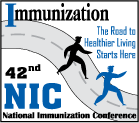
|
|
CDC NIP/NIC Home Page
|
Tuesday, March 18, 2008
236
Conducting Assessments in the Public Health Setting and Making Them Work
Rebecca S. Coyle, Idaho Immunization Program, Idaho Department of Health and Welfare, 450 W State Street, PO Box 83720, Boise, ID, USA
Learning Objectives for this Presentation:
By the end of the presentation participants will be able to understand ways to utilize assessments in a public health setting to achieve greater vaccine coverage.
Background:
Public health settings as a whole provide services for a very diverse and mobile population. Ensuring that children who receive immunization services in these settings complete the immunization series is often a challenge.
Setting:
Public health clinics, public health departments, AFIX staff, private clinics
Population:
Communities that receive public health immunization services
Project Description:
The state of Idaho has required all health departments to conduct an annual assessment utilizing Co-CASA/CASA of all children 19-35 months of age that received immunization services at the public health department. Since the contract inception several of the health departments have taken the assessment requirement and expanded this to monthly assessments coupled with follow up on the reports generated from the monthly assessments to increase immunization coverage levels. Health departments that have implemented follow up with the reports typically have coverage rates that are in the mid to high eighties, higher than the national average for the 4:3:1:3:3:1 series.
Health departments run Co-CASA reports monthly to highlight children that are coming due for immunizations and those that are over due and utilize these reports to conduct reminder-recall services.
Results/Lessons Learned:
Public health departments have increased immunization coverage levels above the national average for the 4:3:1:3:3:1 immunization series.
Additionally the health departments have found that targeting children before they turn 12 months of age increases the likelihood that children will complete the series on time.
See more of Exhibit and Poster Viewing Session (and Break)
See more of The 42nd National Immunization Conference (NIC)
See more of The 42nd National Immunization Conference (NIC)